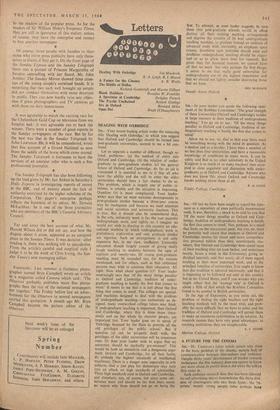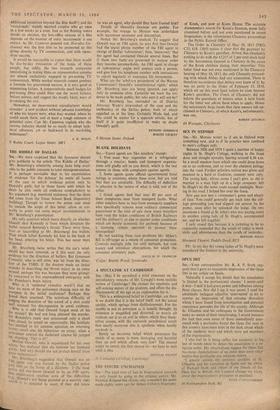A FUTURE FOR THE CINEMA
SIR,—Mr. Cameron's latest article comes very close to the basic problem of the cinema, namely lack of communication between film-makers and audience. Despite thirty years' development of market research techniques, the film industry does not appear to know any more about its public than it did when the talkies first came in. Such audience research data that has been released (to sell advertising space) demonstrates the sharp divi- sion of cinemagoers into two basic types: the 're- gulars,' mainly young people (who perhaps have additional incentives beyond the film itself!) and the 'occasionals,' mainly married couples who go once in a few weeks as a treat. Just as the floating voters decide an election, the box-office success of a film depends on the number of extra 'occasionals' it can attract. As Mr. Cameron pointed out, Hercules Un- chained was the first film to be promoted to this group directly by TV commercials, and with imme- diate success, It would be reasonable to expect that there would be day-by-day evaluation of the tastes of these people, but oddly, the two research companies specialising in testing films on representative samples are almost exclusively engaged in pre-testing TV commercials. While market research cannot produce a formula for guaranteed success, it is very good at minimising failure, A comparatively small budget for pre-testing films could filter out the worst failures before release, and suggest the mostly likely ways of promoting the rest.
Nowadays, no mass-market manufacturer would consider a new product without advance knowledge of who his buyers were, what they wanted, where he could reach them, and at least a rough estimate of potential sales. Can Mr. Cameron explain why the cinema industry should be so ready to adopt tech- nical advances, yet so backward in its marketing techniques?



































 Previous page
Previous page